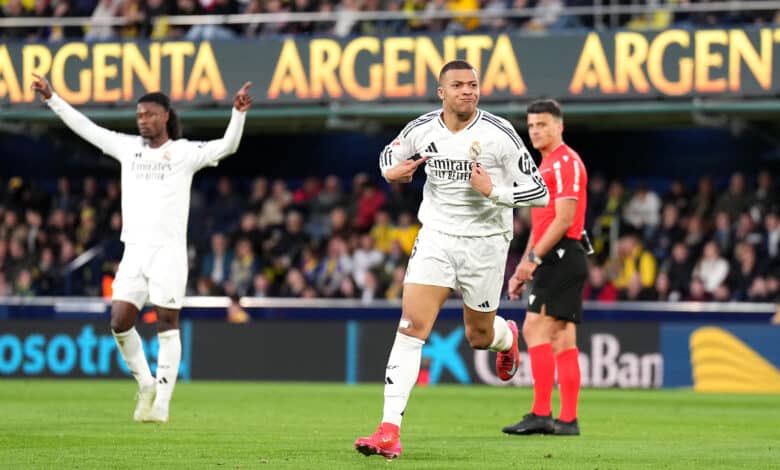Kylian Mbappé’s Red Card Raises Bigger Questions: Are Red Card Bans Too Inconsistent Across Europe?

Kylian Mbappé’s fiery temperament resurfaced again during Real Madrid’s narrow 1-0 win over Alavés, with the Frenchman seeing red in the 38th minute for a dangerous studs-up tackle on Antonio Blanco. As Real Madrid chase Barcelona in a tight La Liga title race, the timing of this incident could prove decisive but beyond the immediate consequences for Los Blancos, Mbappé’s red card has reignited a broader conversation: Why do red card bans vary so much across Europe’s top leagues?
Table of Contents
A Familiar Scene, A Familiar Punishment?
Initial reports suggest Mbappé faces a suspension ranging from one to three matches, depending on the disciplinary committee’s interpretation of intent and severity. Under current regulations, if his suspension remains under four matches, he will still be available for the Copa del Rey final on April 26 against Barcelona a major relief for Real Madrid fans.
But this type of challenge studs up, dangerous, and reckless has resulted in much harsher suspensions in other leagues. So why is La Liga potentially issuing a relatively light punishment?
Breaking Down the Systems: La Liga vs Other European Leagues
- La Liga (Spain): Suspensions for straight red cards generally fall into the 1-3 match range for dangerous play, unless accompanied by clear intent to injure or violent conduct. The final call lies with the Comité de Competición, which evaluates not only the referee’s report but also video evidence and past disciplinary history.
- Premier League (England): The FA usually imposes a minimum of 3 matches for straight red cards related to dangerous tackles or violent conduct. Additional games can be added depending on the seriousness of the challenge or repeated offenses.
- Serie A (Italy): Like the Premier League, the Italian FA tends to be stricter. Dangerous play often earns 3 to 4 match bans, and the disciplinary process leans heavily on video reviews, sometimes revisiting actions missed by the referee during the match.
- Bundesliga (Germany): The German DFB is often more case-specific, but suspensions for similar tackles typically start at 2 matches and can extend beyond 3 for intentional or excessively dangerous actions.
- Ligue 1 (France): Where Mbappé collected three red cards during his time at PSG, the French system offers flexibility, but has also delivered 3-match suspensions for similar reckless fouls. Notably, Mbappé received such a sanction in 2019 after a high challenge in the Coupe de France final.
Recent Controversial
Red Cards Across Europe Recent red card incidents in Europe have sparked debates over consistency and fairness in disciplinary decisions. Here’s a breakdown of some of the most controversial red cards in recent years:
La Liga
In October 2023, Robert Lewandowski was sent off in Barcelona’s match against Osasuna for a studs-up challenge. The tackle was deemed dangerous, but Lewandowski received a three-match suspension. Some felt the ban was too lenient, given the severity of the challenge.
Premier League
In February 2024, Lewis-Skelly was controversially sent off by Oliver in the first half of Arsenal‘s 1-0 win over Wolves for fouling Matt Doherty, his studs-up tackle led to a three-match suspension. a decision which was later overturned after an appeal by Arsenal, who were handed a £65,000 fine for their on-field reaction to the red card.
Serie A
In April 2016, Gonzalo Higuaín was sent off during Napoli’s clash with Udinese after a second yellow card sparked an aggressive outburst. He shoved the referee and continued protesting furiously. The disciplinary committee handed him a four-match ban, one of the most severe suspensions for dissent in recent Serie A history.
Bundesliga
In September 2023, Freiburg’s Nicolas Höfler was sent off for a dangerous studs-up tackle on Borussia Dortmund’s Marcel Sabitzer. After VAR confirmed the challenge, the DFB imposed a three-match suspension, citing serious foul play and risk of injury to the opponent.
Ligue 1
During a 1–4 defeat to Montpellier, Alexandre Lacazette was sent off for a reckless foul on Téji Savanier. Initially expected to receive a standard one-match ban, the disciplinary committee imposed a three-match suspension, with one match suspended, citing the dangerous nature of the challenge. This decision was viewed by some as particularly harsh, especially considering Lacazette’s role as Lyon’s key forward.
Should Europe Harmonize Sanctions for Red Cards?
Mbappé’s disciplinary record now at four career red cards shows a pattern of poor decision-making in key moments. But the inconsistency in how leagues treat the same type of offenses only adds confusion for fans and clubs alike. A studs-up tackle on an opponent’s calf is potentially career-threatening, regardless of where it occurs.Why should the consequences differ so drastically between Madrid, Manchester, Milan or Paris?
Some argue that UEFA should implement minimum suspension standards for reckless or dangerous play across its affiliated leagues. Others suggest that the autonomy of national FAs allows for cultural and contextual differences in interpreting the game but does that help or hurt fair play?
A Costly Absence for Real Madrid and a Question of Fairness
Real Madrid will now likely face crucial fixtures without their talisman, including a top-four clash with Athletic Bilbao and against Getafe. With Mbappé scoring over a third of Madrid’s La Liga goals, his absence could seriously hinder their pursuit of Barcelona, just four points ahead in the standings.
Meanwhile, the looming decision by La Liga’s Competition Committee will once again highlight the lack of consistency across European football in how disciplinary issues are handled. Whether Mbappé receives a lenient two-game ban or a harsher three-match suspension, the broader question remains:
Are current disciplinary systems doing enough to deter dangerous play — and should there be a unified standard across Europe’s top leagues?



